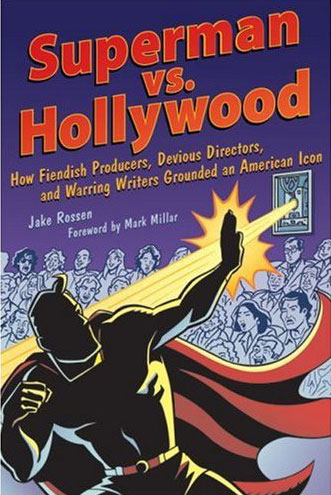 Last week a landmark decision was handed down in the long simmering legal battle between Warner Bros (and DC Comics) and the heirs of Jerry Siegel, one of the creators of Superman: Siegel’s widow and daughter have finally become joint copyright holders with DC and friends (let’s just call them Warner Bros from here on in).
Last week a landmark decision was handed down in the long simmering legal battle between Warner Bros (and DC Comics) and the heirs of Jerry Siegel, one of the creators of Superman: Siegel’s widow and daughter have finally become joint copyright holders with DC and friends (let’s just call them Warner Bros from here on in).
Before getting to what this might mean for Superman in the movies, it’s worth noting the main irony here: this decision was facilitated by big corporations like Warner Bros. Back in the 70s Congress fucked with copyright law in a pretty major way to help the big boys – like WB and Disney – hold on to their famous characters and keep them from public domain, where they rightfully should be by now. The Copyright Act of 1976 gave creators a shot at getting back rights, something that Judge Stephen G Larson, the guy handing down the Superman decision, says was to make up for the ‘unequal bargaining position of authors, resulting in part from the
impossibility of determining a work’s prior value until it has been
exploited.’
The decision may mean that WB owes the Siegel’s cuts from all Superman profits from 1999 on (excluding foreign profits). It also means that it’s quite possible that in 2013 the entire Superman copyright will be out of Warner Bros’ hands, as Joe Shuster’s estate takes the other half.
The Siegels don’t get the copyright to everything, just the elements as portrayed in Action Comics #1; Superman’s powers and most of his friends and villains premiered after that, but the name, the costume and Clark Kent and Lois Lane are, pending a Warner Bros appeal, now co-owned.
So what does that all mean? There’s certainly going to be an appeal by Warner Bros, so for the moment it means nothing. It’s worth noting, though, that DC took Superboy out of commission when the Siegel’s won their case over that copyright – could Final Crisis be Superman’s swan song for the near future (almost certainly not, since the next weekly DC series is called Trinity and focuses on Superman, Batman and Wonder Woman). I imagine we’ll see Superman comics being produced for the foreseeable future.
But what about on the movie side of things? Superman’s had a dark cloud over his head at Warner Bros for some time now, as the latest movie took a decade (and lots of expense) to get going and then turned out to not be the kind of earner the studio wanted. There’s a lot of talking about a sequel, but the studio has remained very cautious about it, and no real forward movement has happened over the last year. The truth is that Warner Bros is trying to figure out if the character of Superman is one who can be profitable, and if half the profits are going to have to go to the Siegels, all of a sudden the idea of spending a whole lot of money on his next film seems a lot less attractive.
Nobody knows what’s going to happen, but if I had to guess I’d say that this further cools Warner Bros’ interest in a Man of Steel movie. Even if they could get the film made and out before the final ruling on the case, if it all falls for the Siegels WB will still have to share the profits*. The same, by the way, would go for the Justice League movie. If the rumors about Superman being written out of the film are true, they’re probably even truer after the ruling.
What I found most interesting about the whole ruling from a comic book movie point of view, though, is that Judge Larson has expressed concern about a ‘sweetheart deal’ between Time Warner subsidiary DC Comics and Warner Bros. Has Warner Bros licensed Superman for a rate that’s below his worth? If this was followed up on, things could get really interesting – I’ve long held that the big problem for DC Comics is that all of their characters are stuck at one studio. If the folks at Warner Bros don’t understand Character X, the character can’t be shopped to other studios that might. And even if Warner Bros ‘got’ every character, they certainly don’t want a slate of only DC Comics movies. Marvel’s ability to shop their self-financed films to other studios for distribution is why they’re getting down to the C-level characters.
*I’m not taking into account the evils of studio accounting, although the Siegels seem so litigious WB may be afraid to play accounting games with them.